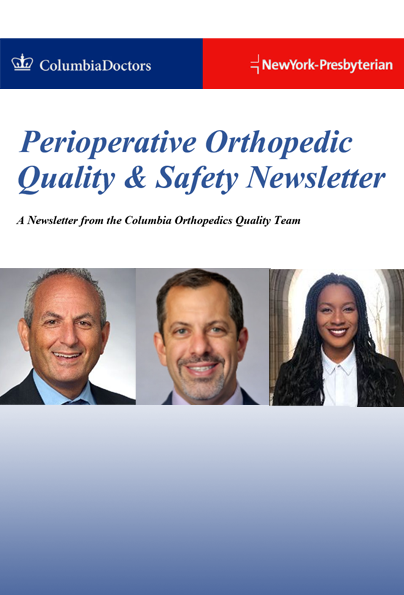July 18, 2023
Perioperative Orthopedic Quality & Safety Newsletter
Dr. Michael G. Vitale, Vice-Chair, Strategy & Quality, Columbia Orthopedics Quality Team, is pleased to share this quarterly newsletter with you.
Happy Summer from the Columbia Orthopedics team! We are excited to continue sharing our perioperative quality updates and reading list for this quarter. Since our last issue, we have welcomed two Quality & Performance Improvement (QPI) fellows, Erin Butrico (2021-2022) and Chinenye E. Ezeh (current: 2022-2023), and a new fellow (Melanie Brown, 2023-2024) who will join the team in July of this year.
As the current fellow, Chinenye has been leading several quality and performance improvement initiatives across the hospital, including projects related to wrong site surgery, surgical site infections, blood ordering & testing, and perioperative efficiency improvement for total hip & knee arthroplasty procedures. Read below for more details on some of her projects and their impact on perioperative efficiency and patient safety!
- Columbia Orthopedics Quality Team:
- Dr. William N. Levine, Chairman, Orthopedic Surgery
- Dr. Michael G. Vitale, Vice-Chair, Strategy & Quality
- Chinenye E. Ezeh, Quality & Performance Improvement Fellow
- Dr. William N. Levine, Chairman, Orthopedic Surgery

Meet Our Quality & Performance Improvement Fellows!
Chinenye E. Ezeh
(Current QPI Fellow: 2022–2023)
Chinenye obtained a Bachelors degree in Global and Public Health Sciences from Cornell University, as well as a Master of Public Health in Healthy Policy & Management and Certificate in Infectious Disease Epidemiology from Columbia University. Before joining our team, Chinenye was an Operations Intern at the NewYork-Presbyterian Hospital/Weill Cornell campus as a part of her graduate studies. Upon completing her fellowship in July, Chinenye will serve as a Project Manager in Operations at NewYork-Presbyterian Hospital.
Erin Butrico
(Past QPI Fellow: 2021-2022)
Erin obtained a Bachelors degree in Psychology and French from Duke University, as well as a Master of Health Administration from Johns Hopkins University. Prior to joining our team, Erin worked at Deloitte Consulting in their Life Sciences practice. She now serves as a Project Manager in Operations at NewYork-Presbyterian Hospital.
Melanie Brown
(Future QPI Fellow: 2023-2024)
Melanie obtained a Bachelors degree in Human Development from Cornell University. She recently obtained her Master of Health Administration from Cornell University in the spring and will be joining the team as the new QPI Fellow in July!



Current Projects
CUSP Arthroplasty: Utilizing a Unit-Based Team Approach to Improve Perioperative Efficiency in Adult Hip and Knee Arthroplasty Procedures

The Comprehensive Unit-Based Safety Program (CUSP) is a quality and patient safety program developed by Johns Hopkin University and has been implemented across a range of healthcare settings. It aims to both identify and address opportunities for quality and patient safety improvement in accordance with the core principles of safety science.
Our hospital has adapted CUSP to target perioperative efficiency for pediatric spinal fusions, adult cardiac cases, and now adult total hip and knee arthroplasty procedures. Large bimonthly collaborative CUSP meetings involve senior hospital leaders, as well as leaders from the operating room, anesthesia, central processing & sterilization, scheduling, and frontline staff.
Additionally, several workgroups were created to target system stressors across the perioperative workflow and directly implement interventions to address them. Since the implementation of CUSP Arthroplasty in November of 2021, the team has experienced the following wins:
- Increase in first case on-time start rate from 45% to 81%
- Decrease in room turnover time from 49 minutes to 41 minutes
- Decreases in time for first case delays, anesthesia preparation, in-room patient preparation, operation, patient exit, and overall case length for both total hip and knee arthroplasty procedures.
- Improved team communication and satisfaction
- Shift in team culture that encourages staff to identify areas of improvement and engage in solution-driven discussions.
Prevention of Wrong Site Surgeries
Although wrong site surgeries are rare intraoperative events, they are most common within the orthopedic surgical service and have devastating ramifications for patients and providers alike. Our department implemented a quality project focused on the prevention of near miss wrong site surgery cases. Primary project interventions included the following:
- Optimization of the electronic medical record (EMR) to create templates for procedure description that utilized plain language, which helps to clarify laterality and other procedure information
- Modified consent view that allows for laterality and other procedure information to be visible while the patient provides their signature
- Standardization of surgical pre-operative notes to clarify procedure laterality and surgical site
This project also established an improved pre-operative patient verification process that requires two registered nurses (RNs) to verify with their initials that information across the consent form, history & physical (H&P), original case booking, and surgical site marking are consistent. The EMR was further optimized to allow RNs to view the consent form, H&P, and original case booking simultaneously on their computers to make this verification process easier and quicker to complete in the pre-operative unit. Since the implementation of this project in July of 2022, the number of near miss wrong site surgery cases in the orthopedic surgical service has dropped to zero.




